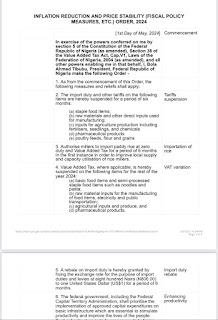INFLATION REDUCTION AND PRICE STABILITY (FISCAL POLICY MEASURES, ETC.) ORDER, 2024
[1st Day of May, 2024] Commencement
In exercise of the powers conferred on me by
section 5 of the Constitution of the Federal
Republic of Nigeria (as amended), Section 38 of the Value Added Tax Act, Cap,V1, Laws of the Federation of Nigeria, 2004 (as amended), and all other powers enabling me in that behalf, I, Bola Ahmed Tibubu, President, Federal Republic of Nigeria make the following Order -
1. As from the commencement of this Order, the following measures and reliefs shall apply:
2. The import duty and other tariffs on the following items are hereby suspended for a period of six months:
(a) staple food items;
(b) raw materials and other direct inputs used
for manufacturing;
(c) inputs for agriculture production including
fertilisers, seedlings, and chemicals
(d) pharmaceutical products
(e) poultry feeds, flour and grains
3. Authorise millers to import paddy rice at zero duty and Value Added Tax for a period of 6 months in the first instance in order to improve local supply and capacity utilisation of rice millers.
4. Value Added Tax, where applicable, is hereby suspended on the following items for the rest of the year 2024:
(a) basic food items and semi-processed
staple food items such as noodles and
pasta;
(b) raw material inputs for the manufacturing
of food items, electricity and public
transportation;
(c) agricultural inputs and produce, and
(d) pharmaceutical products.
The Federal Government is considering a six-month suspension of import duties on staple food items, drugs, and other essential items as a measure to curb inflation.
This is contained in a document sent to President Bola Tinubu for review and approval.
The document also includes plans to waive levies on fertilizers, poultry feed, flour, and grains.
Bloomberg reported that President Tinubu is yet to sign the document for implementation.
The Inflation Reduction and Price Stability Order, as outlined in the document, will mandate the Ministry of Finance and the Central Bank of Nigeria to devise a plan for offering low-interest loans to the agriculture, pharmaceutical, and manufacturing sectors.
“This productive deployment will ultimately improve outputs and reduce inflation,” the document said.
The president is also likely to suspend value-added tax (VAT) on automotive gas oil, some basic food items and semi-processed staple food items such as noodles and pasta, raw-material inputs for the manufacture of food items, electricity and public transportation, as well as agricultural inputs and produce and pharmaceutical products for the rest of the year.
Importation of Paddy Rice
Nairametrics had earlier reported that the federal government in its Accelerated Stabilization and Advancement Plan (ASAP) report submitted by Finance Minister, Wale Edun, is considering the importation of paddy rice into the country as well as maize.
The ASAP report recommended an executive order on the importation of paddy rice to millers to stem the growing tide of food inflation across the country.
The document also recommends the following:
Import duty & VAT suspension on specified items
Importation of paddy rice by millers
Import duty exchange rate peg
Meanwhile, the proposed plan by the federal government conflicts with earlier statements by President Tinubu on food imports earlier this year.
The President in an address to State Chairpersons of his All Progressive Congress (APC) had stated that his administration will not continue food imports hoping to turn the present challenge into an opportunity for the future.
What you should know
In Nigeria, a food crisis looms large, challenging the nation’s stability. Food prices have surged, with food inflation reaching 40.5%.
Among the hardest-hit commodities is rice, a dietary staple. In the past year alone, rice prices have skyrocketed by 169%, reaching nearly N90,000 per bag in March and April.
This sharp increase in food costs is placing immense strain on households across the country, exacerbating an already fragile economy.
It’s estimated that around 31 million Nigerians may face severe food shortages by August this year.
The repercussions of this crisis extend far beyond economic concerns, impacting health, education, and overall societal well-being.





Comments
Post a Comment